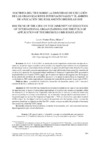Please use this identifier to cite or link to this item:
https://accedacris.ulpgc.es/jspui/handle/10553/106602
| Title: | Doctrina del TJUE sobre la inmunidad de ejecución de las organizaciones internacionales y el ámbito de aplicación del Reglamento Bruselas I bis | Other Titles: | Doctrine of the CJEU on the immunity of execution of international organizations and the field of application of the brussels i bis regulation | Authors: | Pérez Martín, Lucas Andrés | UNESCO Clasification: | 5603 Derecho internacional | Keywords: | Civil And Commercial Matters Deposit Agreement Immunity From Execution Immunity From Jurisdiction Provisional Attachment, et al |
Issue Date: | 2021 | Journal: | Cuadernos de derecho transnacional | Abstract: | In 2020 the CJEU has framed in two important resolutions the types of actions in which the legal business of states or international organizations with private law persons are included within the framework of the Brussels I bis Regulation under the domain of civil and commercial maters and are not covered by the principle of international law of immunity from jurisdiction and enforcement. In the present paper we analyze the Judgment of September 3, 2020, which resolves a procedure in which NATO alleged that the deposit contract to ensure the payments of a fuel supply contract to assist the operation carried out in Afghanistan after The 2001 attacks, were protected by the principle of immunity from execution, which the CJEU denied. En el año 2020 el TJUE ha enmarcado en dos importantes resoluciones los tipos de acciones en los que los negocios jurídicos de los estados o las organizaciones internacionales con personas del derecho privado se comprenden dentro del ámbito de aplicación del Reglamento Bruselas I bis como materia civil y mercantil y no están amparados por el principio de Derecho internacional de inmunidad de jurisdicción y ejecución. En el presente trabajo analizamos la Sentencia 3 septiembre 2020, que resuelve un procedimiento en el que la OTAN alegaba que el contrato de depósito de aseguramiento de los pagos de un contrato de suministro de combustible para asistir a la operación desarrollada en Afganistán tras los atentados de 2001 estaba amparado por el principio de inmunidad de ejecución, lo que negó el TJUE. |
URI: | https://accedacris.ulpgc.es/handle/10553/106602 | DOI: | 10.20318/cdt.2021.6012 | Source: | Cuadernos de Derecho Transnacional [EISSN 1989-4570],v. 13 (1), p. 1034-1043 |
| Appears in Collections: | Artículos |
Page view(s) 10
193
checked on Oct 12, 2024
Download(s)
270
checked on Oct 12, 2024
Google ScholarTM
Check
Altmetric
Share
Export metadata
Items in accedaCRIS are protected by copyright, with all rights reserved, unless otherwise indicated.
